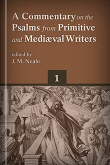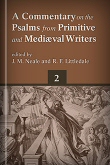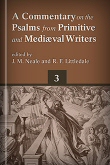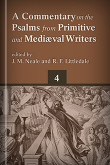Commentary on the Psalms from Primitive and Mediæval Writers (4 vols.)
Digital Logos Edition
Overview
In Commentary on the Psalms from Primitive and Mediæval Writers, editors J. M. Neale and R. F. Littledale have condensed the writings of the Church Fathers and other important writers from the Middle Ages into a verse-by-verse commentary of all 150 Psalms. This unique four-volume collection weaves together commentary on the Psalms from the Venerable Bede, Dionysius the Carthusian, Cyril of Alexandria, Gregory the Great, Thomas Aquinas, Saint Augustine, and many more. Additionally, Neale and Littledale reference various office-books and hymns from the Roman, Mozarabic, Ambrosian, Gallican, Greek, Coptic, Armenian, and Syriac Rites.
This is the ultimate collection for studying the Psalms in the same spirit that the mediæval commentators approached them. With the Logos edition, all Scripture passages in the Commentary on the Psalms from Primitive and Mediæval Writers (4 vols.) are tagged and appear on mouse-over. What’s more, Scripture references are linked to the wealth of language resources in your Logos library. This makes these texts more powerful and easier to access than ever before for scholarly work or personal Bible study. With the advanced search features of Logos Bible Software, you can perform powerful searches by topic or Scripture reference—finding, for example, every mention of “strength” or “Psalms 19:14.”
- Verse-by-verse commentary on all 150 Psalms
- Each Psalm includes an introduction and various thoughts from the writings of the Church Fathers
- Completely searchable, linked to your preferred Bible translation and the other books in your library
This commentary on the Psalms is an important contribution to theological literature, in two points of view, as a collection of antique facts and opinions in relation to this portion of Holy Scripture, and as an example of mystical exegesis.
—Journal of Sacred Literature and Biblical Record
It will be found by those who have any taste at all for such studies a rich and valuable mine to which they may again and again recur without running the slightest risk of digging out the contents too hastily.
—Guardian
A work of singular interest to the devotional reader, and one which will open a new field of thought to theological students.
—Christian Remembrancer
This commentary is both theologically and devotionally an immense advance upon any commentary upon any portion of Holy Scripture which has yet to be written.
—Church Review
To clergymen it will prove invaluable for homiletical purposes, as an abundance of new trains of thought will be suggested, which will give their sermons that freshness which is as unusual as it is desirable in pulpit utterances. And no less a boon will it be to those of the laity who enjoy a book, which without requiring any great amount of continuous reading, will give food for meditation, and enable them to enter with more interest into that book of Holy Scripture which they are probably more familiar with than with any other.
—Church Times

Volume one of the Commentary on the Psalms from Primitive and Mediæval Writers covers Psalms 1–38. In addition to verse-by-verse commentary, each Psalm includes an introduction and various thoughts from the writings of the Church Fathers. Volume one also includes an in-depth introduction to the series, which includes two dissertations: "The Psalms as Employed in the Offices of the Church" and "Primitive and Mediæval Commentators on the Psalms," which provides concise biographical notices of the principal commentators referenced in all four volumes. A third dissertation, "The Mystical and Literal Interpretation of the Psalms," will be found after the thirtieth Psalm.

Volume two of the Commentary on the Psalms from Primitive and Mediæval Writers covers Psalms 39–80. In addition to verse-by-verse commentary, each Psalm includes an introduction and various thoughts from the writings of the Church Fathers. A dissertation, "Chronology and Authorship of the Psalms," explores the "original" order of the Psalms and discusses the many problems of trying to discern their "true" chronological sequence.

Volume three of the Commentary on the Psalms from Primitive and Mediæval Writers covers Psalms 81–118. In addition to verse-by-verse commentary, each Psalm includes an introduction and various thoughts from the writings of the Church Fathers.

Volume four of the Commentary on the Psalms from Primitive and Mediæval Writers covers Psalms 119–150. In addition to verse-by-verse commentary, each Psalm includes an introduction and various thoughts from the writings of the Church Fathers. This volume also includes the dissertation "The Psalms as Used in the Sacraments and Rites of the Church" and provides an index of Scripture references for the entire collection.
John Mason Neale (1818–1866) was educated at Trinity College, Cambridge, where he founded the Cambridge Camden Society (later known as the Ecclesiological Society). He was also the principal founder of the Anglican and Eastern Orthodox Churches Union in 1864, later known as the Anglican and Eastern Churches Association. A well-known hymnist and translator, his works include An Introduction to the History of the Holy Eastern Church, Essays on Liturgiology and Church History, and O come, O come, Emmanuel.
Richard Frederick Littledale (1833–1890) was born in Dublin and educated at Bective House Seminary and Trinity College, Dublin. His numerous works include The Priest's Prayer Book and The People's Hymnal.
Reviews
11 ratings
Kelly Fleming
10/26/2023

Kevin Bratcher
6/12/2018

Deacon Tim Johnson
4/10/2014

Larry Proffitt (I
11/13/2013

Bill Shewmaker
10/8/2013
Eduardo Vega
9/25/2013

Robert J Smith
9/22/2013

Michael Mullen
9/17/2013

Caleb Allen
9/9/2013
Michael Maria Waldstein
8/25/2013